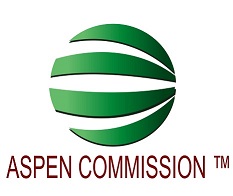ASPEN COMMISSION ™
THE CENTER FOR PHILOSOPHY POLITICS SPIRITUALITY AND SCIENCE ™
Diplomatic engagement bilaterally and in international fora, the Department and our embassies will continue to work to break down barriers to U.S. exports and target unfair policies that adversely affect U.S. businesses. Our expanded outreach to U.S. exporters, including by identifying market opportunities and challenges and publicizing foreign procurement tenders, will remain critical to efforts to boost U.S. exports. We will target assistance efforts to create a level playing field for doing business, including rules supporting fair and reciprocal trade, business friendly regulation, and adherence to high standards. The Department will modernize defense trade policies and regulations to support national security and foreign policy goals, increase resilience, and enhance the competitiveness of key U.S. manufacturing and technology sectors. We will promote education exports, such as study in the United States, through student advising centers and other programs, and support American scientists, engineers, and innovators in international settings. The Department’s officials will work bilaterally and through international institutions to ensure that foreign governments do not employ practices such as weak labor, environment, or intellectual property rights systems, data localization requirements, or state subsidies to compete unfairly. We will also work to establish clear, transparent markets outside of formal negotiations, expanding fair access for U.S. products, services, and technology. Department of State and USAID programs will support market-based economic reform efforts and target improved commercial law and trade regimes, benefiting U.S. exporters by reducing barriers at foreign borders. We will work to empower women economically, as a driver of development and trade. We will leverage public-private partnerships and targeted foreign assistance to work with foreign partners to address barriers to trade and investment and economic growth. Cross Agency Collaboration Interagency partners include the Departments of the Treasury (DOT), Commerce (DOC), Transportation (DOT), Homeland Security (DHS), Justice (DOJ), the United States Trade Representative (USTR), Overseas Private Investment Corporation (OPIC), Trade and Development Agency (USTDA), Millennium Challenge Corporation (MCC), Federal Communications Commission (FCC), Federal Aviation Administration (FAA), Federal Maritime Commission, Maritime Administration, Customs and Border Protection (CBP), the Department of Agriculture (DOA), Environmental Protection Agency (EPA), and the National Oceanic and Atmospheric Administration (NOAA). Other partners include American Chambers of Commerce overseas and the U.S. Chamber, foreign development assistance agencies, and multilateral development finance institutions. Risk Financial crisis and recession can trigger protectionist responses that make it more difficult to open foreign markets. A strong dollar can lead to fewer foreign visitors and students, and affect the competitiveness of U.S. exports. Technological diffusion and the spread of economic activity to emerging markets, while positive overall, could reduce the ability of the United States to shape international institutions and economic developments outside our borders. Disruptive technologies could continue to present challenges as well as opportunities to traditional commerce. State capitalism prevalent in some countries can distort markets and impede U.S. business opportunities, while corruption subverts open markets and impedes the ability of American companies to compete. By 2022, using 2017 baseline data, support increased exports of U.S. goods and services by increasing by 50 percent appropriate commercial advocacy for U.S. businesses
By 2022, support increases in exports of U.S. digital products and services by advocat-ing for regulatory Byenvironments that enable cross-border data flows and digital trade, contributing to information and communi-cations technology (ICT) services growing to more than $70 billion
|

World Markets
-- Teddy Roosevelt, 26th President of the United States of America
Aspen Commission ™ All Rights Reserved 1996-2025
IBS INTERNATIONAL BOARD OF STANDARDS
Aspen Commission Academy of International Relations, Philosphy Politics and Innovation - International Political Foregin Relations Public Policy Council. The Aspen Commission ™ is an Association Registered in Colorado and is also a listed as an Limited Company CO USA.
CEO Commission Join Mission Ethics Home Continuing Ed Government Jobs Awards Degrees Certification newspapers Diplomacy markets Links Careers Disclaimer
Accreditation and Recognition: GAFM * www.GAFM.org * www.CertifiedProjectManager.eu * www.AAFM.org * Certified Project Manager * Certified e-Commerce Consultant * Royal Law Society * Royal Business Society * Royal Business College * Royal Fellows * Royal Economics Academy * Oxford Law School * AAFM * Certified International Project Manager * www.GMentz.com * www.CertifiedProjectManager.org * www.GeorgeMentz.com * www.AAFM.us * www.icecc.com * www.reclaimingspirituality.com *